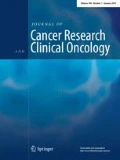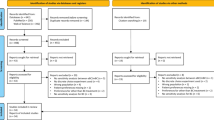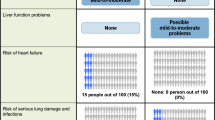Abstract
Purpose
Some medical treatment for metastatic colorectal cancer (CRC) may have marginal survival benefit, but cause toxicities. The purpose of this study is to determine metastatic CRC patients’ tradeoffs in making a decision to undergo new medical treatment.
Methods
We conducted a survey of patients with a diagnosis of advanced CRC who were currently receiving or completed one chemotherapy regimen. First, patients were asked to rate the importance of 15 medical treatment-related adverse events that may arise as a consequence of chemotherapy or biological therapy in their treatment decision-making. Then, the patient identified his or her top five most important events and solicited preferences in hypothetical metastatic CRC treatment vignettes using the standard gamble technique.
Results
A total of 107 patients responded to the survey. From the list of medical treatment-related adverse events, patients identified clinically serious ones such as stroke, heart attack, and gastrointestinal perforation as the most important in their medical treatment decision-making, yet placed lower willingness to tolerate symptom-related events such as pain, fatigue, and depression. Generally, patients who were older, stage III versus IV and who had prior radiotherapy, lower educational attainment, and lower household income (all p <0.05) were less willing to tolerate any medical treatment-related adverse events after adjusting for other demographic and clinical characteristics.
Conclusions
Variations in patients’ willingness to tolerate different treatment-related adverse events underscore the need for improved communications between physicians and patients about the risks and benefits of their medical treatment, which helps make a more personalized decision for metastatic CRC treatment.

Similar content being viewed by others
References
Edge SB, Byrd DR, Compton CC, Fritz AG, Greene FL, Trotti AE (eds) (2010) AJCC cancer staging manual, 7th edn. Springer, Berlin
Arora NK, Hesse BW, Rimer BK, Viswanath K, Clayman ML, Croyle RT (2008) Frustrated and confused: the American public rates its cancer-related information-seeking experiences. J Gen Intern Med 23:223–228
Audrey S, Abel J, Blazeby JM, Falk S, Campbell R (2008) What oncologists tell patients about survival benefits of palliative chemotherapy and implications for informed consent: qualitative study. BMJ 337:a752
Back A, Arnold RM, Baile WF, Tulsky JA, Fryer-Edwards K (2010) Improving oncologists’ communication skills. http://depts.washington.edu/oncotalk. Accessed 20 Dec 2013
Choueiri TK, Mayer EL, Je Y et al (2011) Congestive heart failure risk in patients with breast cancer treated with bevacizumab. J Clin Oncol 29:632–638
CMS (2014) Clinical quality measures. http://www.cms.gov/Regulations-and-Guidance/Legislation/EHRIncentivePrograms/ClinicalQualityMeasures.html
Cowen ME, Miles BJ, Cahill DF, Giesler RB, Beck JR, Kattan MW (1998) The danger of applying group-level utilities in decision analyses of the treatment of localized prostate cancer in individual patients. Med Decis Making 18:376–380
Craig BM, Reeve BB, Cella D, Hays RD, Pickard AS, Revicki DA (2014) Demographic differences in health preferences in the United States. Med Care 52:307–313
Epner DE, Baile WF (2014) Difficult conversations: teaching medical oncology trainees communication skills one hour at a time. Acad Med 89:578–584
Fischer G, Kamlet MS, Fienberg S, Schkade D (1986) Risk preference for gains and losses in multiple objective decision making. Manag Sci 31:1065–1086
Fu AZ, Kattan MW (2006) Racial and ethnic differences in preference-based health status measure. Curr Med Res Opin 22:2439–2448
Galfrascoli E, Piva S, Cinquini M et al (2011) Risk/benefit profile of bevacizumab in metastatic colon cancer: a systematic review and meta-analysis. Dig Liver Dis 43:286–294
Ganz P (2015) Quality of cancer care, plenary address. Washington, DC, world congress of psycho-oncology, from national to global: implementing the standard of psychosocial care in oncology
Gattellari M, Butow PN, Tattersall MH (2001) Sharing decisions in cancer care. Soc Sci Med 52:1865–1878
Goelz T, Wuensch A, Stubenrauch S et al (2011) Specific training program improves oncologists’ palliative care communication skills in a randomized controlled trial. J Clin Oncol 29:3402–3407
Grothey A, Van CE, Sobrero A et al (2013) Regorafenib monotherapy for previously treated metastatic colorectal cancer (CORRECT): an international, multicentre, randomised, placebo-controlled, phase 3 trial. Lancet 381:303–312
Hahn EA, Cella D, Dobrez DG et al (2007) The impact of literacy on health-related quality of life measurement and outcomes in cancer outpatients. Qual Life Res 16:495–507
Harris KA (1998) The informational needs of patients with cancer and their families. Cancer Pract 6:39–46
Hurwitz H, Fehrenbacher L, Novotny W et al (2004) Bevacizumab plus irinotecan, fluorouracil, and leucovorin for metastatic colorectal cancer. N Engl J Med 350:2335–2342
Institute of Medicine (2013) Delivering high-quality cancer care: charting a new course for a system in crisis. National Academies Press, Washington, DC
Kaldjian LC, Curtis AE, Shinkunas LA, Cannon KT (2008) Goals of care toward the end of life: a structured literature review. Am J Hosp Palliat Care 25:501–511
Kattan MW (2003) Comparing treatment outcomes using utility assessment for health-related quality of life. Oncology (Williston Park) 17:1687–1693
Kattan MW, Cowen ME, Miles BJ (1997) A decision analysis for treatment of clinically localized prostate cancer. J Gen Intern Med 12:299–305
Laryionava K, Heussner P, Hiddemann W, Winkler EC (2015) Framework for timing of the discussion about forgoing cancer-specific treatment based on a qualitative study with oncologists. Support Care Cancer 23:715–721
Leighl NB, Butow PN, Tattersall MH (2004) Treatment decision aids in advanced cancer: when the goal is not cure and the answer is not clear. J Clin Oncol 22:1759–1762
Leighl NB, Shepherd HL, Butow PN et al (2011) Supporting treatment decision making in advanced cancer: a randomized trial of a decision aid for patients with advanced colorectal cancer considering chemotherapy. J Clin Oncol 29:2077–2084
Ness RM, Holmes A, Klein R, Greene J, Dittus R (1998) Outcome states of colorectal cancer: identification and description using patient focus groups. Am J Gastroenterol 93:1491–1497
Ness RM, Holmes AM, Klein R, Dittus R (1999) Utility valuations for outcome states of colorectal cancer. Am J Gastroenterol 94:1650–1657
O’Connor AM, Rostom A, Fiset V et al (1999) Decision aids for patients facing health treatment or screening decisions: systematic review. BMJ 319:731–734
Prigerson HG, Bao Y, Shah MA et al (2015) Chemotherapy use, performance status, and quality of life at the end of life. JAMA Oncol 1:778–784
Ramlau R, Gorbunova V, Ciuleanu TE et al (2012) Aflibercept and Docetaxel versus Docetaxel alone after platinum failure in patients with advanced or metastatic non-small-cell lung cancer: a randomized, controlled phase III trial. J Clin Oncol 30:3640–3647
Ross PL, Littenberg B, Fearn P, Scardino PT, Karakiewicz PI, Kattan MW (2003) Paper standard gamble: a paper-based measure of standard gamble utility for current health. Int J Technol Assess Health Care 19:135–147
Sanda MG, Dunn RL, Michalski J et al (2008) Quality of life and satisfaction with outcome among prostate-cancer survivors. N Engl J Med 358:1250–1261
Semenza GL (2008) A new weapon for attacking tumor blood vessels. N Engl J Med 358:2066–2067
Street RL Jr, Voigt B (1997) Patient participation in deciding breast cancer treatment and subsequent quality of life. Med Decis Making 17:298–306
Stryker JE, Wray RJ, Emmons KM, Winer E, Demetri G (2006) Understanding the decisions of cancer clinical trial participants to enter research studies: factors associated with informed consent, patient satisfaction, and decisional regret. Patient Educ Couns 63:104–109
Sullivan PW, Lawrence WF, Ghushchyan V (2005) A national catalog of preference-based scores for chronic conditions in the United States. Med Care 43:736–749
Torrance GW (1987) Utility approach to measuring health-related quality of life. J Chronic Dis 40:593–603
Walling A, Lorenz KA, Dy SM et al (2008) Evidence-based recommendations for information and care planning in cancer care. J Clin Oncol 26:3896–3902
Weeks JC, Catalano PJ, Cronin A et al (2012) Patients’ expectations about effects of chemotherapy for advanced cancer. N Engl J Med 367:1616–1625
Wright AA, Zhang B, Ray A et al (2008) Associations between end-of-life discussions, patient mental health, medical care near death, and caregiver bereavement adjustment. JAMA 300:1665–1673
Zafar SY, Malin JL, Grambow SC et al (2013) Chemotherapy use and patient treatment preferences in advanced colorectal cancer: a prospective cohort study. Cancer 119:854–862
Acknowledgments
This study was supported by the Ruesch Center for the Cure of Gastrointestinal Cancers at Georgetown University, and Grant P30CA051008 from the National Cancer Institute. Dr Jensen was supported in part by Grant Number KL2TR000102 from the National Center for Research Resources (NCRR) and the National Center for Advancing Translational Sciences (NCATS), National Institutes of Health (NIH), through the Clinical and Translational Science Awards Program (CTSA).
Author information
Authors and Affiliations
Corresponding author
Ethics declarations
Conflict of interest
J. L. M. has received a speaker honorarium from Genentech, Bayer, Amgen, and Celgene. Other authors declared no conflict of interest.
Ethical approval
All procedures performed in studies involving human participants were in accordance with the ethical standards of the institutional and/or national research committee and with the 1964 Helsinki declaration and its later amendments or comparable ethical standards.
Informed consent
Informed consent was obtained from all individual participants included in the study.
Rights and permissions
About this article
Cite this article
Fu, A.Z., Graves, K.D., Jensen, R.E. et al. Patient preference and decision-making for initiating metastatic colorectal cancer medical treatment. J Cancer Res Clin Oncol 142, 699–706 (2016). https://doi.org/10.1007/s00432-015-2073-4
Received:
Accepted:
Published:
Issue Date:
DOI: https://doi.org/10.1007/s00432-015-2073-4




